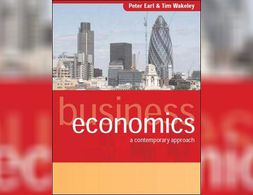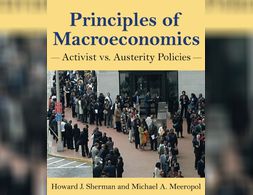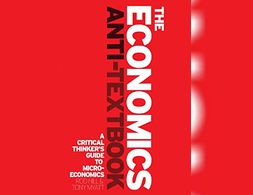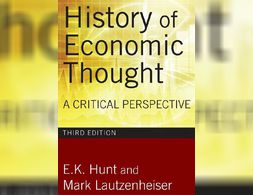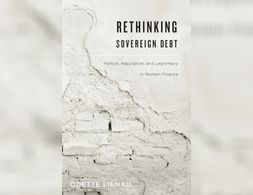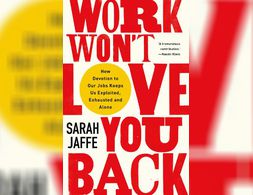✕
512 results
This syllabus provides an overview of the contents of the course "The Philosophy and Methodology of Economics" at the Duke University
Photo by timJ on Unsplash Do you wish to know how to analyze and solve business and economic questions with data analysis tools Then Econometrics by Erasmus University Rotterdam is the right course for you as you learn how to translate data into models to make forecasts and to support …
Colonial Global Economy is a module of the Connected Sociologies Curriculum Project and examines the ongoing significance of colonial relations in the structure of the global economy It consists of 7 introductory lectures which range between 17 and 39 minutes of length In addition further readings resources and questions for …
This course provides a simple introduction to problems that social scientists are working on (e.g. racial disparities, inequality and climate change) in a manner that does not require any prior background in Economics or Statistics.
The 2007-2008 financial crisis exposed the shortcomings of mainstream economic theory with economists unprepared to deal with it. In the face of this, a major rethinking of economics seems necessary and in presenting alternative approaches to economic theory, this book contributes to the rebuilding of the discipline.
This brief responds to the criticism that mainstream economics is currently facing due to its heavy reliance on models and narrow range of quantitative research techniques. It takes a broader view, identifying issues that are also relevant for heterodox and pluralist approaches to economics.
The Austrian School of Economics is an intellectual tradition in economics and political economy dating back to Carl Menger in the late-19th century. Menger stressed the subjective nature of value in the individual decision calculus. Individual choices are indeed made on the margin, but the evaluations of rank ordering of ends sought in the act of choice are subjective to individual chooser.
Geographical economics starts from the observation that economic activity is clearly not randomly distributed across space. This revised and updated introduction to geographical economics uses the modern tools of economic theory to explain the who, why and where of the location of economic activity. The text provides an integrated, first-principles introduction to geographical economics for advanced undergraduate students and first-year graduate students, and has been thoroughly revised and updated to reflect important developments in the field, including new chapters on alternative core models and policy implications.
The world of economics is changing. Years of turmoil in the global economy mean that nothing will ever be quite the same again. This is the starting point and theme of this radically revised Economist books classic.
Designed for both undergraduates and MBA students taking their first course in business economics, this text focuses on introducing students to economics as a framework for understanding business. It is structured around problems that decision-makers face, such as rejuvenating the firm in the face of declining demand.
This volume explores the relationship between law and economics principles and the promotion of social justice. By social justice, we mean a vision of society that embraces more than traditional economic efficiency. Such a vision might include, for example, a reduction of subordination and discrimination based on race, religion, gender, sexual orientation, age, disability or class.
The Elgar Companion to Neo-Schumpeterian Economics surveys the achievements of the most visible scholars in this area. The contributions to the Companion give both a brief survey on the various fields of neo-Schumpeterian economics as well as insights into recent research at the scientific frontiers.
This brief but comprehensive account of the Post Keynesian approach to economic theory and policy is ideal for advanced undergraduate and postgraduate students in economics, public policy and other social sciences. Clear, non-technical and with a strong policy focus, it will also appeal to all of those who are dissatisfied with mainstream economics and wish to explore the alternatives.
In this book the author develops a new approach to uncertainty in economics, which calls for a fundamental change in the methodology of economics. It provides a comprehensive overview and critical appraisal of the economic theory of uncertainty and shows that uncertainty was originally conceptualized both as an epistemic and an ontological problem.
The Learning Economy and the Economics of Hope' brings together the most important contributions by an expert on policies, management and economics of innovation and knowledge. It offers original insights in processes of innovation and learning and it draws implications for economic theory and public policy. It introduces the reader to important concepts such as innovation systems and the learning economy.
Following an unprecedented economic boom fed by foreign investment, the Russian Revolution triggered the worst sovereign default in history. Bankers and Bolsheviks tells the dramatic story of this boom and bust, chronicling the forgotten experiences of leading financiers of the age.
This book sets out to encourage a debate about the role that economic theory and philosophy of economics can play. A good part of economics consists of theoretical developments which describe completely imaginary worlds and have no connections to actual market economies
Since the beginning of the twenty-first century, there has been an unprecedented move towards 'rethinking economics' due to the damages generated by the global financial crisis that burst in 2007-2008. Almost a decade after this crisis, policy is still unable to provide all citizens greater wellbeing or at least an encouraging economic future.
Principles of Macroeconomics by Howard J. Sherman and Michael A. Meeropol differs from other texts in that this book stresses far more the inherent instability of the macro-economy.
The world has changed dramatically in recent years and so has the field of economics, but many introductory economics textbooks have remained stuck in the past. This book provides a new beginning for the study of macroeconomics, fundamentally international in its approach and emphasizing current debates and research trends.
Mainstream textbooks present economics as an objective science free from value judgements; that settles disputes by testing hypotheses; that applies a pre-determined body of principles; and contains policy prescriptions supported by a consensus of professional opinion.
The new edition of this classroom classic retains the organizing theme of the original text, presenting the development of thought within the context of economic history.
The second edition of International Political Economy continues to be the perfect short introduction to the fundamental theories and issues of international political economy (IPE).
Ecological economics addresses one of the fundamental flaws in conventional economics--its failure to consider biophysical and social reality in its analyses and equations. Ecological Economics: Principles and Applications is an introductory-level textbook that offers a pedagogically complete examination of this dynamic new field.
In economics the dominant framework for exploring the structure of market economies is provided by the neoclassical school of thought. This text aims to show how neoclassical theory is used to model market mechanisms, both in particular markets and in the market economy as a whole.
This classic text offers a broader intellectual foundation than traditional principles textbooks. It introduces students to both traditional economic views and their progressive critique.
Austerity has been at the center of political controversy following the 2008 financial crisis, invoked by politicians and academics across the political spectrum as the answer to, or cause of, our post-crash economic malaise.
Why do we think that sovereign debt must be repaid--even after a major regime change--in order to maintain country creditworthiness? In a fascinating and highly original book, Odette Lienau argues that this conventional wisdom is overly simplistic and in some respects entirely wrong.
Thinking in Systems, is a concise and crucial book offering insight for problem solving on scales ranging from the personal to the global. Edited by the Sustainability Institute's Diana Wright, this essential primer brings systems thinking out of the realm of computers and equations and into the tangible world, showing readers how to develop the systems-thinking skills that thought leaders across the globe consider critical for 21st-century life.
The book criticizes neoclassical climate economics in the tradition of William Nordhaus. It explains why this kind of thinking is misleading and why neoclassical climate economics asks the wrong questions.
Macroeconomics in Context: A European Perspective lays out the principles of macroeconomics in a manner that is thorough, up to date, and relevant to students. With a clear presentation of economic theory throughout, this latest addition to the bestselling "In Context" set of textbooks is written with a specific focus on European data, institutions, and historical events, offering engaging treatment of high-interest topics, including sustainability, Brexit, the euro crisis, and rising inequality. Policy issues are presented in context (historical, institutional, social, political, and ethical), and always with reference to human well-being.
hether it's working for free in exchange for 'experience', enduring poor treatment in the name of being 'part of the family', or clocking serious overtime for a good cause, more and more of us are pushed to make sacrifices for the privilege of being able to do work we enjoy. Work Won't Love You Back examines how we all bought into this 'labour of love' myth: the idea that certain work is not really work, and should be done for the sake of passion rather than pay.
We use cookies on our website. Click on Accept to help us to make Exploring Economics constantly better!










